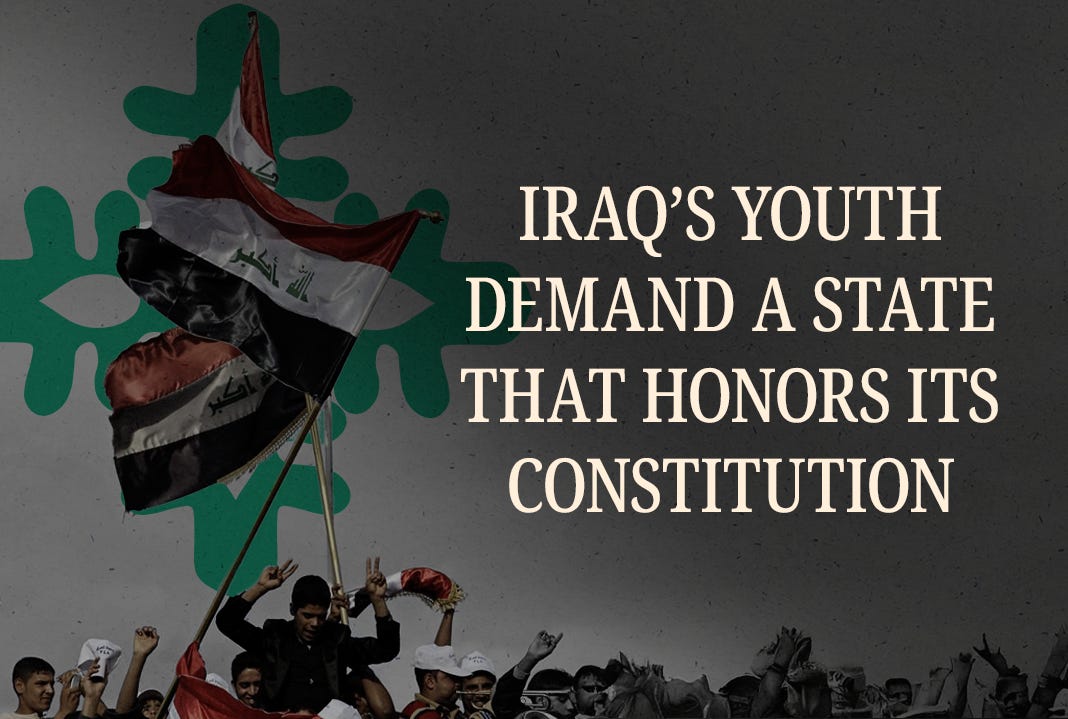Iraq’s Youth Demand a State That Honors Its Constitution
I’m part of the generation fighting for a state that serves its citizens, not its factions. We’re demanding that Iraq finally live by the constitution it wrote a century ago.
A century after Iraq adopted its first constitution in 1925, my generation is demanding that the country finally live by the rules it once wrote but has since failed to live by. For Iraq’s youth, the constitution represents a broken promise.
At a recent event in Baghdad marking the Iraqi Constitutional Centennial, organized by the Al-Rasheed Center for Development, Iraq’s top officials and intellectuals gathered to commemorate the founding of the constitutional state. But the event’s real message came from the country’s younger voices. Their demand was radical and straightforward in its clarity: Iraq must become a state governed by law, not by militias, sectarian quotas, or foreign influence.
For most Iraqis, the word constitution evokes both aspiration and disappointment. It symbolizes the dream of a nation built on citizenship and justice and the failure of every generation of leaders who claimed to uphold it. Power in Iraq has rarely rested on institutions. Instead, it has been captured by political elites, armed groups, and external patrons who treat the constitution as more of a suggestion than a binding legal document.
This pattern has bred a new civic consciousness among Iraq’s youth. We have learned, often painfully, that sovereignty is difficult to preserve. It requires the supremacy of law over arms, and the independence of the judiciary from political pressure. Reclaiming the state begins with reclaiming the constitution and enforcing it without exception.
The centennial event stressed that Iraq does not need another rewritten constitution. What it needs is to implement the one it already has. The 2005 document guarantees the separation of powers, judicial independence, and equal citizenship—on paper. In practice, those provisions are routinely ignored.
Iraq’s youth movements and civil organizations are calling not for revolution, but for reform. They want functioning institutions, not new slogans; judges who are independent, not intimidated; and laws that apply to everyone, not just the powerless. Their movement reflects a maturing political culture that understands that statehood is sustained through accountability, not armed patronage.
The Constitutional Centennial was a civic declaration of intent. In universities, NGOs, and public forums, young Iraqis are redefining patriotism as a commitment to the rule of law. They reject the notion that loyalty to a faction or foreign backer defines one’s national identity.
The Al-Rasheed Center, which I lead and which organized the event, is working to accelerate this momentum. Through workshops and training programs for students, activists, and civil servants, it aims to embed constitutional knowledge in civic life, teaching young Iraqis how to hold institutions accountable and demand transparency from those in power.
Iraq’s constitutional crisis determines who controls resources, who enforces justice, and who speaks for the state. When militias act with impunity and courts are politicized, it is the constitution that has failed—and with it, the promise of equal citizenship.
This new generation understands that. Their activism is not anti-state; it is a demand for a real state—one capable of protecting its citizens and applying the law equally. Nearly a century ago, Article 2 of Iraq’s first constitution declared that “Iraq is a sovereign state, independent and free.” A century later, young Iraqis are asking their leaders to finally make those words true.
They know the alternative to constitutional governance is chaos, and that Iraq cannot afford another lost century defined by corruption and foreign dependency. The constitution will not defend itself; it will survive only if a generation chooses to defend it through civic engagement, education, and public accountability.
If Iraq’s second century is to differ from its first, it will be because its youth insisted that the constitution finally mean what it says. Their struggle is not against the state, but for the one envisioned a hundred years ago—a sovereign state, independent and free.
Middle East Uncovered is powered by Ideas Beyond Borders. The views expressed in Middle East Uncovered are those of the authors and do not necessarily reflect the views of Ideas Beyond Borders.




